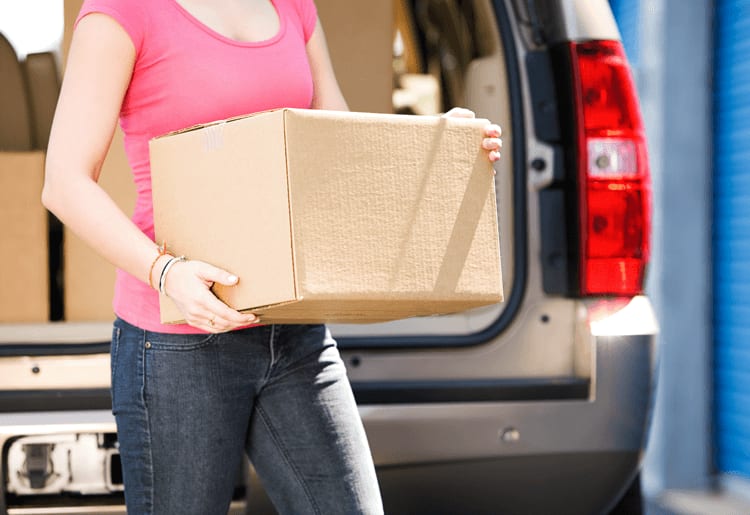Unfortunately, it’s easy to pay much more than you need to for storage. It can also be difficult to know how much storage you actually need. With prices ranging from $20 all the way to $350 per month, how can you know you’re not wasting your cash? Here, you’ll find a comprehensive list of ways to save money when choosing the best storage unit company for you.
1. “Kondo” Your Stuff Beforehand
It can be tempting to just pack up your things and put them straight into storage. However, the truth is that most people end up storing things they will never use again. That is why it’s important to go through the belongings you’re thinking about storing to make sure you definitely want to use them again.
There are many techniques to get rid of belongings you don’t need, but one of the best is the Marie Kondo method. This starts with organizing your items by category to make sure you aren’t storing multiple similar items. Before storing something, check it has a specific important purpose or sparks joy.
The Kondo method can be a really efficient way to understand how much you actually need to store. By not perceiving your storage container as a way to keep the stuff you never want to see again—in other words, the things that would be better suited for donation or sale—you’ll save a lot of money in monthly storage and moving fees.
2. Check Out Coupons and Offers
Storage companies are known for putting out promotional advertising and coupons. This means it can be well worth your time to pick up leaflets and flyers for storage businesses in your area. Also, hunt on the websites of companies like Public Storage and Extra Space Storage for things like “First Month free” and other discounts.
3. Consider All Your Options
The majority of people end up storing their stuff with companies like U-Haul or CubeSmart, but there are thousands of different options out there. As such, it’s a great idea to check out local storage services too because, with these, you’ll be supporting a smaller company whose prices are probably extremely competitive. What’s more, the service from family-owned companies is often exceptional.
Also, some of the bigger companies have surprisingly poor customer service ratings. So, next time you’re driving down the highway or flipping through your local classified ads, keep your eyes open for local storage providers.
4. Negotiate
Once you’ve chosen the storage company you’d like to go with, it is a good idea to get multiple quotes from other providers to use in your negotiation. This is a particularly good idea in case your storage company decides to add on extra fees on the payment day.
Knowing what is a reasonable rate in your area is important because it allows you to avoid being overcharged at checkout. Don’t be afraid to speak up if you feel like you’re paying more than the service deserves.
5. Consider Sharing a Storage Unit
It may be worth posting on social media and messaging friends and family to see if anyone else is looking for a storage unit. Splitting the costs of a slightly larger unit together can be a good way to reduce your overheads. This can also be a good option if you only have a few important things to store that wouldn’t fill up an entire unit.
6. Donate/Sell Easily Replaceable Items
If you take an objective look at your stuff, you might find that there are many items not worth storing simply due to cost. If the price to replace a product is less or the same amount as the cost of storage for a few months, it might be worth donating it to a local thrift shop or selling it. Examples of things that you should get rid of rather than store include things like cheap Ikea furniture, old fridges, washers, and dryers.
7. Loan Out Large Furniture and Appliances
To make sure you’re paying for the smallest possible unit, it is worth seeing if anyone you know could make use of any of your appliances or furniture while you aren’t using them. People are often keen to temporarily rent things like pianos, sewing machines, pool tables, or swimming pools.
8. Correctly size your stuff
A common mistake people make when purchasing storage is buying the incorrect size container. Buy too big and you’ll waste money every month. Buy too small and you’ll face potentially having to expand your storage or part with valuable items. Sites like Pods can help you calculate how much storage you really need. Be warned that most storage calculators have a slight tendency to overestimate space requirements. Keep this in mind especially on sites that are out to sell you storage.
9. Call Or Visit In-Person
Even in an age where everything is online, a phone call or personal visit can help you establish a good relationship with your storage provider. An actual conversation often sets you up to be able to better negotiate prices in a friendly way. You can be more direct in your negotiation and are more likely to get a fair price for your storage.
10. Combine Moving and Storage
If you’re going to be renting a truck, it might be worth trying to bundle moving and storage services with a company like U-Haul. Many storage businesses also rent out moving trucks, and bundling services is a great way to save money right off the bat. If a company doesn’t have a specific deal, it can be worth a calling to negotiate a discount for using their moving and storage services.
Storing Smart Can Save You Money
Whether you’re looking for a small storage unit or enough space to store a whole home’s worth of stuff at bargain prices, there are appropriate companies out there. Just be smart about what you store and take your time to compare local options.

